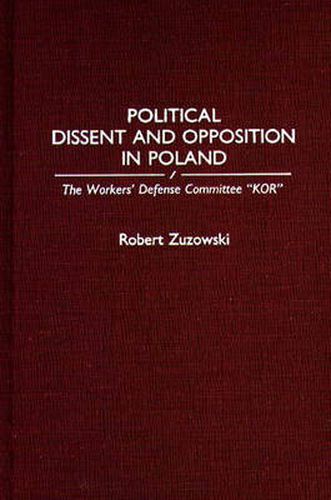Readings Newsletter
Become a Readings Member to make your shopping experience even easier.
Sign in or sign up for free!
You’re not far away from qualifying for FREE standard shipping within Australia
You’ve qualified for FREE standard shipping within Australia
The cart is loading…






Political dissent in Poland after World War II had changed considerably by the early 1980s. In the 1950s and 1960s it was characterised by spontaneity and lack of strategy; the opposite held true in the 1980s. The people of Poland became highly politicised and openly acting dissident organisations, hostile toward the communist state, flourished. Robert Zuzowski presents a comprehensive portrait of the unique pattern of dissent, exemplified by the Worker’s Defence Committee, KOR, which finally triumphed in Poland. He examines the rise of the opposition in Poland, a country which has experienced more political crises than any other East European nation. Zuzowski argues the KOR, by introducing an innovative approach to political dissent in Poland, contributed significantly to the transformation of Polish politics. The volume also explores dissent in Poland during the two decades prior to the formation of KOR. The reasons for the formation of the Worker’s Defence Committee are analysed and its activities from its inception until the summer of 1980 are chronicled. The author then examines the Committee’s relations with the Roman Catholic Church and dissident organisations. Concluding chapters discuss KOR’s formal dissolution and the organisation’s influence on Polish political culture. This volume is intended to interest students of communism and/or sociopolitical change, as well as all those concerned with East European politics.
$9.00 standard shipping within Australia
FREE standard shipping within Australia for orders over $100.00
Express & International shipping calculated at checkout
Political dissent in Poland after World War II had changed considerably by the early 1980s. In the 1950s and 1960s it was characterised by spontaneity and lack of strategy; the opposite held true in the 1980s. The people of Poland became highly politicised and openly acting dissident organisations, hostile toward the communist state, flourished. Robert Zuzowski presents a comprehensive portrait of the unique pattern of dissent, exemplified by the Worker’s Defence Committee, KOR, which finally triumphed in Poland. He examines the rise of the opposition in Poland, a country which has experienced more political crises than any other East European nation. Zuzowski argues the KOR, by introducing an innovative approach to political dissent in Poland, contributed significantly to the transformation of Polish politics. The volume also explores dissent in Poland during the two decades prior to the formation of KOR. The reasons for the formation of the Worker’s Defence Committee are analysed and its activities from its inception until the summer of 1980 are chronicled. The author then examines the Committee’s relations with the Roman Catholic Church and dissident organisations. Concluding chapters discuss KOR’s formal dissolution and the organisation’s influence on Polish political culture. This volume is intended to interest students of communism and/or sociopolitical change, as well as all those concerned with East European politics.